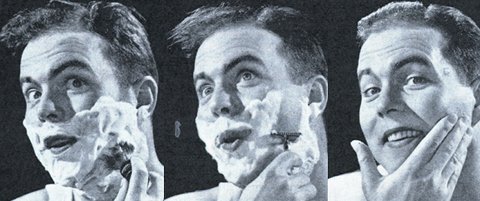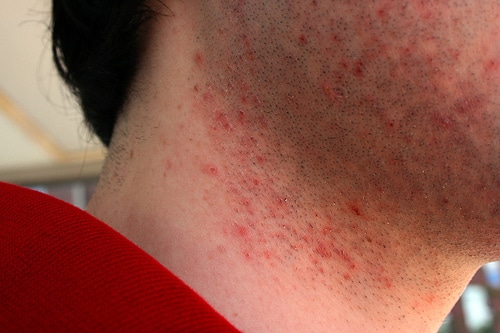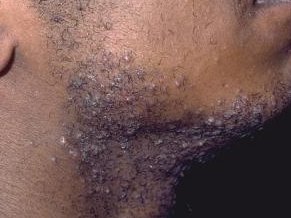
There’s nothing like a good clean shave to start your day off right. A well-shaved face leaves a good impression with potential clients and lady friends. Unfortunately, legions of men are walking around right now with a nasty side effect of improper shaving: razor burn. We’ve all had it at one time or another- that horrible itchy feeling that pops up a few hours after you shave. Razor burn not only ruins a good shave, it just looks bad. But with the proper attack plan, razor burn and razor bumps can be prevented. Here’s yours:
What is Razor Burn?

Razor Burn: It Ain’t Pretty
Razor burn is an irritating rash that sometimes appears after shaving. In its most mild form, razor burn will be slightly itchy and create a noticeable red rash on your face and neck. In severe cases, razor burn can also produce “razor bumps.” Razor bumps are created by ingrown hairs. They look like pimples and they can itch like a mother. Ingrown hairs, and consequently razor bumps, are particularly problematic for African-American men because of their curlier beards.

Razor Bumps
How to Prevent Razor Burn
Soften the beard. A nice soft beard can be removed far more easily than one that feels like a brillo pad. Thus, the best time to shave is after you take a shower. The hot steam will soften up your beard, leaving it in primo condition for shaving. If you want to get your beard really soft, take some hair conditioner and rub it on your beard while you’re in the shower. Leave it on for the duration of the shower and rinse when you’ve finished bathing. Your beard will be as soft as a baby’s bottom.
Exfoliate. Exfoliating isn’t just for your girlfriend. Use a facial scrub or your wife’s poofy loofa thingy to remove dead skin cells and bring potential ingrown hairs out of hiding. I don’t know if it’s manly, but I’m a fan of St. Ive’s Apricot Scrub. It’s inexpensive and really makes your skin feel nice.
Use a badger brush. When you lather up your beard, use an old school badger brush. Using a brush to lather up helps get the shaving cream up under each whisker which results in better, smoother shaves.
Use a safety razor. Some people swear by the five blade razors that are out on the market today. If you can get a good clean shave with those, then keep using them. But if you feel like every shave leaves you with irritation and razor burn, consider shaving with a safety razor. For many men, the multiple blades of today’s modern razors irritate the skin more than needed. It’s overkill. Shaving with a safety razor will eliminate skin irritation and give your face a clean, healthy look because you’re just using one blade instead of several that chew up your face while cutting your whiskers.
Shave with the grain. In an attempt to get that smooth as a baby’s behind touch, many men shave against the grain. While shaving against the grain can get you that smooth feel in one deft swoop, you risk slicing up your face and causing razor burn. Also, shaving too close increases the chances for ingrown hairs and razor bumps. Shave with the grain instead. This will reduce the chances of irritation and razor burn. You won’t be able to remove your beard in one pass when shaving with the grain. That’s okay. Just lather up and make another pass with the razor. Making several passes with the grain is much better than making one pass against the grain.
Use light, short strokes. Applying too much pressure with the razor increases your chances for razor burn. The weight of the razor is sufficient to cut your beard. To keep yourself from applying too much pressure, use short strokes. With longer strokes, we tend to apply more pressure on the razor.
Use a sharp razor. Have you ever tried cutting a tomato with a dull knife blade (or watched an infomerical where they did)? Notice how instead of cutting, you end up tearing the tomato? Well, imagine the tomato being your face. Instead of cutting your whiskers cleanly, a dull blade creates a lot of drag and tears at your whiskers. This increases your chances of creating ingrown hairs and skin irritation. One of the benefits of using a safety razor is that you can change blades frequently and it won’t cost you an arm and a leg. Each blade is about $.25.
Clean the blade with alcohol. One of the main causes of razor burn and skin irritation from shaving is bacteria on your blade. Kill the bastards by wiping down your razor blade with some rubbing alcohol before you start shaving. Some companies sell fancy blade antiseptic for big bucks, but it’s just run of the mill alcohol plus some fragrance. Drugstore rubbing alcohol is all you need.
Clean the blade after every stroke. Every time you make a pass on your face, your blade is collecting whiskers and shaving cream. This goop gets in the way of the blade making a clean cut. Rinse your blade after each pass.
Rinse your face with cold water when done. The cold water helps close up your pores and reduces the probability of pesky whiskers forming ingrown hairs.
Apply a balm or moisturizer. You’ve just finished scraping a piece of sharp metal across your skin, so no matter how carefully you shave, your face is going to be a little unhappy. Aftershaves can feel refreshing, but for some men, they actually add to the irritation. If this is you, try applying a soothing balm or an aloe vera-based cortisone cream in order to reduce redness. You can find shaving balms or cortisone cream at your local drugstore.
Apply a razor bump cream. If you’re an African-American man or susceptible to ingrown hairs, there are a few products you can apply to prevent razor bumps. Bump Stopper and Tend Skin are two products you can find at your local drugstore. Both of these products help prevent ingrown hairs from forming.
Dry your blades and brush. After you’re done shaving, dry off your blade with a towel. This will help prevent the blade from dulling quickly, keeping it nice and sharp for your next shave. Also, be sure to use a holder to hang up your badger hair brush so it gets some air to dry out. A wet brush can grow bacteria that you’ll be slathering on your face the next time you shave.
Listen to our podcast on the secrets to a perfect shave:


